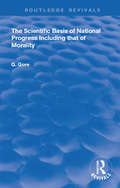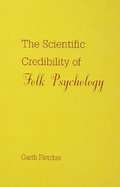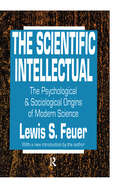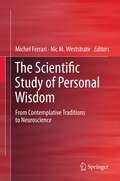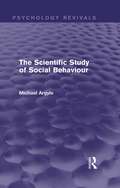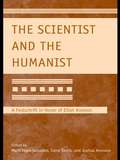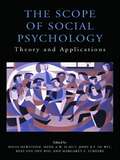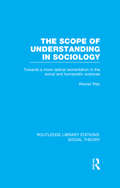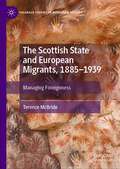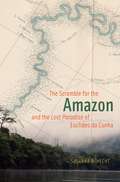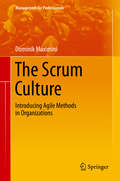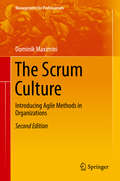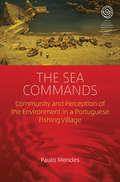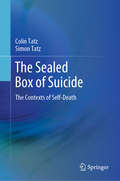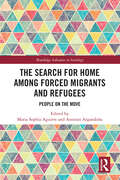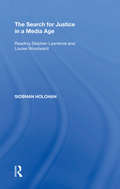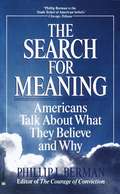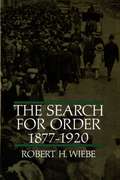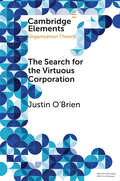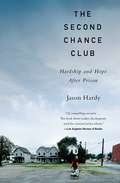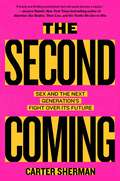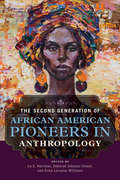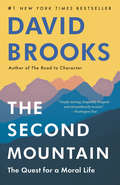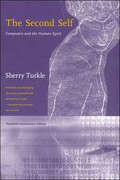- Table View
- List View
The Scientific Basis of National Progress (Routledge Revivals)
by G. GorePublished in 1970: The leading idea of the book is that present knowledge only enables us to maintain our present state, that national progress is the result of new ideas, and that the chief source of new ideas is original research. That as advance has its origin in new knowledge; unless new discoveries are made, new inventions and improvements must sooner or later cease. Another prominent idea is, that truth is essentially the same in all divisions of knowledge, and that the mental powers and processes employed in detecting it are the same in all subjects.
The Scientific Credibility of Folk Psychology
by Garth J.O. FletcherThe examination and evaluation of folk psychology and lay cognition has been carried out predominantly in two domains: personality and social psychology, and the philosophy of psychology. Yet, work in these two areas has largely proceeded independently. The assumption on which this volume is founded is that a proper comparison between scientific cognition and folk ways of thought rests on an adequate study of both science and folk psychology. With this in mind, the author provides an analysis of the intricate, and often hidden, links between these two spheres. In doing so, the book poses two related questions. First, what is the nature of folk psychology and how is it related to scientific psychology? Second, of what should the relationship between folk psychology and scientific psychology consist? In answering these two questions, the author draws extensively from research and arguments in social psychology and social cognition, cognitive science, and the philosophy of science.The interdisciplinary approach gives the book a unique perspective that will be of interest to scholars working in social psychology, cognitive science, and philosophy of science. Written in a concise and accessible style, this volume is suitable for undergraduate and graduate students as well as a general psychological audience.
The Scientific Intellectual: The Psychological & Sociological Origins of Modern Science
by Lewis S. FeuerThe birth of modern science was linked to the rise in Western Europe of a new sensibility, that of the scientific intellectual. Such a person was no more technician, looking at science as just a job to be done, but one for whom the scientific stand-point is a philosophy in the fullest sense. In The Scientific Intellectual, Lewis S. Feuer traces the evolution of this new human type, seeking to define what ethic inspired him and the underlying emotions that created him.Under the influence of Max Weber, the rise of the scientific spirit has been viewed by sociologists as an offspring of the Protestant revolution, with its asceticism and sense of guilt acting as causative agents in the rise of capitalism and the growth of the scientific movement. Feuer takes strong issue with this view, pointing out how it is at odds with what we know of the psychological conditions of modern societies making for human curiosity and its expression in the observation of and experiment with nature.Feuer shows that wherever a scientific movement has begun, it has been based on emotions that issue in what might be called a hedonist-libertarian ethic. The scientific intellectual was a person for whom science was a 'new philosophy,' a third force rising above religious and political hatreds, seeking in the world of nature liberated vision, a intending to use and enjoy its knowledge. In his new introduction to this brilliantly readable volume, Professor Feuer reviews the book's critical reception and expands the scope of the original edition to include fascinating discussions of Francis Bacon, Thomas Edison, Charles Darwin, Thomas Hardy, and others. The Scientific Intellectual will be of interest to scientists and intellectual historians.
The Scientific Study of Personal Wisdom: From Contemplative Traditions to Neuroscience
by Michel Ferrari and Nicholas WeststrateThe rich and diverse contributions to this volume span a wide variety of disciplines, from psychology and philosophy to neuroscience, by some of the most influential scholars in the emerging science of personal wisdom. As such, it is a collection of essential readings and the first publication to integrate both the spiritual and pragmatic dimensions of personal wisdom.The content of the book goes beyond speculative theory to present a wealth of scientific research currently under way in this expanding field. It also describes numerous promising methods now being deployed in the quest for scientific knowledge of the elusive, yet critical, phenomenon of personal wisdom. The book is an excellent introduction to the field for novice researchers as well as a stimulating and enlightening resource for established experts. Its broad appeal makes it a vital addition to the libraries of academics and practitioners in many disciplines, from developmental psychology to gerontology, and from philosophy to contemplative religious traditions such as Buddhism.
The Scientific Study of Social Behaviour (Psychology Revivals)
by Michael ArgyleOriginally published in 1957, this book presented an up-to-date account of psychological research into human social behaviour of the time. There are chapters on interaction between pairs of people, behaviour in small social groups, and human relations in industry. The author avoided the adoption of any particular theoretical position, and concentrated on the established empirical findings of the time. The results of several hundred investigations are summarised and compared, so that the principal generalisations which emerge can be seen. Stress is placed on rigorous methods of research, and a critical account is given of current techniques of social research, showing the importance of experimental and statistical methods. Careful consideration is given to the danger of the investigator disturbing what is being investigated. Use is made of recent ideas about theory and explanation, and the different kinds of theory used in experimental psychology were considered for the first time as possible ways of accounting for group behaviour. This book was intended not only for students of psychology and of the other social sciences, but also for industrialists, administrators and indeed all who were interested in the laws underlying social behaviour. Today it can be read and enjoyed in its historical context.
The Scientist and the Humanist: A Festschrift in Honor of Elliot Aronson (Modern Pioneers in Psychological Science: An APS-Psychology Press Series)
by Carol Tavris Joshua Aronson Marti Hope GonzalesElliot Aronson is among the 100 most influential psychologists of the 20th Century. He is best known for his theorizing and research on cognitive dissonance theory -- one of the most provocative and enduring theories in contemporary psychology -- and for his design of the "jigsaw classroom," an applied method of reducing conflict and prejudice in multiethnic schools. Throughout his illustrious career, he has championed the application of social-psychological theory and methods for solving such pressing social problems as prejudice, energy efficiency, conflict and miscommunication in relationships, and the reasons why many people justify their mistakes rather than learn from them. Aronson is the only psychologist in the history of the American Psychological Association to have won all three of its top awards: for research, teaching, and writing. In this Festschrift, friends, colleagues, and former students write with warmth, clarity, and humor about Aronson’s enduring influence on the field of social psychology and on their own professional lives as researchers, writers, and teachers. Topics covered include contemporary research on cognitive dissonance theory; the changing face of experimentation in social psychology; and applied research on energy policy, education, the legal system, intergroup conflict, and prejudice and discrimination.
The Scope of Social Psychology: Theory and Applications (A Festschrift for Wolfgang Stroebe) (Psychology Press Festschrift Series)
by Miles Hewstone Henk A. W. Schut John B. F. de Wit Kees van den Bos Margaret S. StroebeSocial psychology attempts to understand, explain, predict and, when needed, change people's thoughts, feelings and behaviours. For a relatively young discipline it has already made great strides toward this awe-inspiring goal. Pioneers such as Lewin, Asch, Kelley and Festinger began groundwork in the 1940s and 1950s, but it was only in the late 1960s that social psychology came of age. Since then it has blossomed, both in investigating the basics of the discipline and in applying the insights from fundamental social psychology to different fields related to the area. This volume is devoted to the development of understanding in the field of social psychology over the last four decades, focusing on both basic and applied social psychology. Contributions are gathered under five main areas: attitudes and attitude change; social cognition and emotions; interpersonal and group processes; health behavior; and bereavement and coping. These five domains not only illustrate the scope of social psychology, but also pay tribute to one of the key figures in modern social psychology, Wolfgang Stroebe. Remarkably, he has made significant contributions across all five of these areas, and his research achievements exemplify the progress, prospects and problems faced by modern social psychology over the last 40 years. This volume includes contributions from some of the most distinguished names in the field, and all authors provide an overview or critical look at their specific area of expertise, tracing historical developments where appropriate. The Scope of Social Psychology provides a broad-ranging, illustrative review of the field of modern social psychology.
The Scope of Understanding in Sociology (Routledge Library Editions: Social Theory)
by Werner PelzIn their efforts to emulate the methodology which had proved so successful in the natural sciences, the social sciences – including sociology – have not yet faced the question as to what constitutes understanding in their area with sufficient seriousness. This book asks again: what does understanding denote in an area where man tries to understand man, where self-understanding is involved, where new understanding immediately becomes part of that which is to be understood? What can we know and what is the use and limitation of knowledge in sociology? When are we conscious that we know and understand? Werner Pelz argues for a thorough reorientation in our approach to sociological thinking, and suggests that scientistic preconceptions have often precluded possibly fruitful approaches to humane understanding. He investigates the relations between various kinds of knowing, and examines the new possibilities of understanding made available, for example, by psychoanalytical and phenomenological insights, as well as by those of poets, artists, mystics. He shows that in the social and humanistic sciences, creative or constitutive contributions illuminate rather than demonstrate, and that, for this reason, sociology has not yet found an appropriate method for conveying them without serious distortions.
The Scottish State and European Migrants, 1885–1939: Managing Foreignness (Palgrave Studies in Migration History)
by Terence McBrideThis book examines the efforts of the government in Scotland to manage the increase of migrants travelling to Britain at the end of the nineteenth century. Focussing on the period between 1885 and 1939, the book explores how the Scottish machinery of government handled the administration of ‘foreigners.’ The author uses a comparative, thematic approach to analyse migrant experiences, identities, and relationships with state institutions. Drawing from state records held by the National Records of Scotland in Edinburgh, the book argues that Scottish officials in semi-autonomous boards began to recognise, describe and enumerate the presence of the ‘foreigner’ in the early twentieth century, framing their handling of foreignness in accordance with the Aliens Act of 1905. The author goes on to explain that institutions operating in Scotland developed a distinctly Scottish approach to alien matters, which continued up until the Second Word War. Therefore, an increasing number of importantdecisions affecting migrants were taken by a distinctly Scottish machinery of government, impacting on how Scottish officials understood foreignness, and how those identified as foreigners understood their identity in relation to Scottishness. Contributing significantly to current heated debates on migration and identity amongst researchers and the general public in Europe and beyond, this book provides essential insights into the ways in which a ‘sub-state’ began to develop practices, processes and attitudes towards migration which were not always in line with that of the central government.
The Scramble for the Amazon and the "Lost Paradise" of Euclides da Cunha
by Susanna B. HechtThe fortunes of the late nineteenth century’s imperial and industrial powers depended on a single raw material—rubber—with only one source: the Amazon basin. And so began the scramble for the Amazon—a decades-long conflict that found Britain, France, Belgium, and the United States fighting with and against the new nations of Peru, Bolivia, and Brazil for the forest’s riches. In the midst of this struggle, Euclides da Cunha, engineer, journalist, geographer, political theorist, and one of Brazil’s most celebrated writers, led a survey expedition to the farthest reaches of the river, among the world’s most valuable, dangerous, and little-known landscapes. The Scramble for the Amazon tells the story of da Cunha’s terrifying journey, the unfinished novel born from it, and the global strife that formed the backdrop for both. Haunted by his broken marriage, da Cunha trekked through a beautiful region thrown into chaos by guerrilla warfare, starving migrants, and native slavery. All the while, he worked on his masterpiece, a nationalist synthesis of geography, philosophy, biology, and journalism he named the Lost Paradise. Da Cunha intended his epic to unveil the Amazon’s explorers, spies, natives, and brutal geopolitics, but, as Susanna B. Hecht recounts, he never completed it—his wife’s lover shot him dead upon his return. At once the biography of an extraordinary writer, a masterly chronicle of the social, political, and environmental history of the Amazon, and a superb translation of the remaining pieces of da Cunha’s project, The Scramble for the Amazon is a work of thrilling intellectual ambition.
The Scrum Culture
by Dominik MaximiniThis book is a guide for managers, Scrum Masters and agile coaches who are interested in agile organizational methods and who are planning to introduce Scrum at their own company. Scrum is not only a product development framework but can also be used to structure activities for agile and lean organizational development. Divided into five major parts, the book first introduces and defines the Scrum Culture. It explains its relevance, highlights a number of pain points typical for first encounters with Scrum, and embeds it in an introduction to organizational change. This is complemented with many real-life examples that help to apply the concepts to readers' own specific contexts. The second part describes the principles of introducing Scrum in detail, while the third part embarks on the practical application of these principles, drawing on a wealth of experience gathered in many successful introduction projects. Part four focuses on a detailed case study of a Scrum transformation before part five provides, in closing, a number of appendices offering extensive information on Scrum and its principles.
The Scrum Culture: Introducing Agile Methods In Organizations (Management For Professionals)
by Dominik MaximiniThis book is a guide for managers, Scrum Masters and agile coaches who are interested in agile organizational methods and who are planning to introduce Scrum at their own company. Scrum is not only a product development framework but can also be used to structure activities for agile and lean organizational development.Divided into six major parts, the book first introduces and defines the Scrum Culture briefly. It explains its relevance, highlights a number of pain points typical for first encounters with Scrum, and embeds it in an introduction to organizational change. This is complemented with many real-life examples that help to apply the concepts to readers’ own specific contexts. The second part describes the principles of introducing Scrum in detail, while the third part embarks on the practical application of these principles, drawing on a wealth of experience gathered in many successful introduction projects. Part four focuses on a detailed case study of a Scrum transformation before part five provides the scientific background information and study details that led to the findings in part one. In closing, part six offers a number of appendices with extensive information on Scrum and its principles.The second edition of this book has been updated throughout and fundamentally re-organized for better readability.
The Sea Commands: Community and Perception of the Environment in a Portuguese Fishing Village (EASA Series #40)
by Paulo MendesAzenha do Mar is a fishing community on the southwest coast of Portugal. It came into existence around forty years ago, as an outcome of the abandonment of work in the fields and of propitious ecological conditions. This book looks at the migration processes since the founding of the community and how they relate to the social inequalities for property and labour which prevail today. The book also reflects upon the personal experience of the ethnographer in the field balancing the importance of methodology on the one hand and fieldwork as a research process on the other.
The Sealed Box of Suicide: The Contexts of Self-Death
by Colin Tatz Simon TatzThis unique book explores suicide as more than just a manner of death. It challenges the myths, beliefs, dogma, and customs of suicide from the earliest theories. It offers fresh insights into dark spaces. World-wide, suicide deaths are three times greater than homicides, and are increasing. Current approaches to stem this ‘epidemic’ are not working, or have very limited success. Mental health interventions, theories about a suicide or a depression gene, and the ever-increasing dispensing of antidepressants have not lessened the stark statistics. The authors attempt to understand the soul of the suicide — addressing the social, economic, political, historical, geographic, and cultural contexts in which suicide occurs. The social order is indelibly connected to settings, places, circumstances, relationships, occupations, climate, and milieus. Most of the 36 diverse categories of self-motivated deaths defy a ‘one-size-fits-all’ approach. Recognising contexts and looking outside the confines that have imprisoned thinking about suicide, could well be more effective in alleviating or mitigating suicide than years searching for a possible vaccination against such death.The book is an appeal to move beyond the medical model of suicide. Written in a very accessible style, it is of interest to social scientists, philosophers, professionals and researchers in public health, medical and behavioural sciences, and lay persons alike.A critical, stimulating and moral tale of suicide that provides a new look -–Michael J. Kral, PhD, School of Social Work, Wayne State University, Michigan, USA … a major breakthrough and a step in the right direction in addressing the problem of suicide-–Said Shahtahmasebi, PhD, Research Director, the Good Life Research Centre Trust, Christchurch, New Zealand … informed understanding of suicide’s multiplicity and historical instability – Jennifer White, PhD, School of Youth and Child Care, University of Victoria, British Columbia, Canada
The Search for Home among Forced Migrants and Refugees: People on the Move (Routledge Advances in Sociology)
by Antonio Argandoña Maria Sophia AguirreThis book explores the role of "home" in the lives of displaced people, including voluntary and forced migrants, refugees, asylum seekers, internally displaced people and temporary workers. For displaced people, home is something lost, longed for and sometimes found anew. It is a community of people in an environment of relationships and a physical dwelling that provide a sense of safety, security, hope and belonging. Much of the efforts of refugees, migrants and exiles are devoted to rebuilding a home, through a combination of personal effort and collaboration with the political and social environment of the host community. Maria Sophia Aguirre and Antonio Argandoña bring together an interdisciplinary collection of contributors to analyse these challenges through the lenses of economics, law, sociology, psychology, communications, management and political science. The book offers numerous suggestions for assistance aimed not only at the short-term problems of displaced people but also at ensuring their human dignity. This volume will be a valuable resource for students and scholars of the sociology of migration and of public policy related to the handling of migrants.
The Search for Justice in a Media Age: Reading Stephen Lawrence and Louise Woodward
by Siobhan HolohanWhat can we learn from the legal cases of Stephen Lawrence and Louise Woodward? How do the legal system and the media contribute to a collective understanding of class, nation, race and gender? In this book, Siobhan Holohan explores media representations of law and order in the context of notions of multi-culturalism and victim-centred politics. Two high profile cases - the murder of Stephen Lawrence and the US trial of the British au-pair, Louise Woodward - are examined. Holohan argues that the stories built up around Woodward and Lawrence - the organization of public discourse around a sacrificial figure - have contributed to exclusionary patterns of social order. The book offers a perceptive account of what makes some criminal legal cases prone to scrutiny and spectacle and provides a vivid illustration of the presence of power relations in legal decisions. In conclusion, the author draws on the model of the Macpherson report to propose a more inclusive form of social and legal judgement that takes into account social inequalities.
The Search for Meaning: Americans Talk About What They Believe and Why
by Phillip L. BermanA Grand Wizard of the Ku Klux Klan, a Wall Street broker, a survivor of Auschwitz, college students, scientists, and others are only a few of the individuals interviewed for this this oral history of the varied faiths.
The Search for Order 1877-1920
by Robert H. WiebeAmericans sought the organising principles around which a new viable social order could be constructed in the modern world. This subtle and sophisticated study combines the virtues of historical narrative, sociological analysis, and social criticism.
The Search for the Virtuous Corporation: Wicked Problem or New Direction for Organization Theory? (Elements in Organization Theory)
by Justin O'BrienThe corporation is the most complex, adaptive, and resilient model of organizing economic activity in history. In an era of globalization, the transnational corporation has significant power over society. While its rights are specified through private ordering, and choice of jurisdictional home, in the event of conflict of laws, the corporation's duties and responsibilities remain contested. Notwithstanding the argument in institutional economics that all transactions take place within governance and legal frameworks, underpinned by a 'non-calculative social contract,' the terms are notoriously difficult to define or enforce. They are made more so if regulatory dynamics preclude litigation to a judicial conclusion. This Element situates the corporation – its culture, governance, responsibility, and accountability – within a broader discourse of duty. In doing so, it addresses the problem of the corporation for society and the corporation's problem in aligning its governance to changing community expectations of obligation.
The Second Chance Club: Hardship and Hope After Prison
by Jason HardyA former parole officer shines a bright light on a huge yet hidden part of our justice system through the intertwining stories of seven parolees striving to survive the chaos that awaits them after prison in this illuminating and dramatic book. Prompted by a dead-end retail job and a vague desire to increase the amount of justice in his hometown, Jason Hardy became a parole officer in New Orleans at the worst possible moment. Louisiana&’s incarceration rates were the highest in the US and his department&’s caseload had just been increased to 220 &“offenders&” per parole officer, whereas the national average is around 100. Almost immediately, he discovered that the biggest problem with our prison system is what we do—and don&’t do—when people get out of prison. Deprived of social support and jobs, these former convicts are often worse off than when they first entered prison and Hardy dramatizes their dilemmas with empathy and grace. He&’s given unique access to their lives and a growing recognition of their struggles and takes on his job with the hope that he can change people&’s fates—but he quickly learns otherwise. The best Hardy and his colleagues can do is watch out for impending disaster and help clean up the mess left behind. But he finds that some of his charges can muster the miraculous power to save themselves. By following these heroes, he both stokes our hope and fuels our outrage by showing us how most offenders, even those with the best intentions, end up back in prison—or dead—because the system systematically fails them. Our focus should be, he argues, to give offenders the tools they need to re-enter society which is not only humane but also vastly cheaper for taxpayers. As immersive and dramatic as Evicted and as revelatory as The New Jim Crow, The Second Chance Club shows us how to solve the cruelest problems prisons create for offenders and society at large.
The Second Coming: Sex and the Next Generation's Fight Over Its Future
by Carter ShermanEqual parts investigative reporting and cultural criticism, this is a look at the sex lives of young adults in post-Roe v. Wade, post-#MeToo America—and how the challenges they face are harbingers of what&’s coming for the rest of us.As a college student, award-winning journalist Carter Sherman, along with several members of her sorority, was interviewed by a writer looking for salacious details about their sex lives. But the sex the girls were having—or the lack thereof—seemed disappointing, and their stories didn&’t make the book&’s final cut. A decade later, young Americans are having less sex than past generations, and the sex they are having is infinitely more complicated. Sherman, who has spent years traveling the country reporting on gender and sexuality, wanted to find out why. Based on more than one hundred interviews with teenagers and young adults, activists, and experts, The Second Coming reveals how (mis)education, the internet, and politics have not only reshaped relationships but also unleashed a nationwide power struggle over the future of sex. From abortion clinics crowded with young patients, to &“Dating with Dignity&” seminars at the National Pro-Life Summit, to school board battles over what students should read, think, and feel, we meet folks from both sides of the aisle who are well-informed, empowered, and active (even if not always sexually). And as measures are taken to limit Americans&’ access to rights and resources, they are fighting back. In the tradition of Rebecca Traister and Lisa Taddeo, The Second Coming explores how the ballot box has infiltrated the bedroom, and the breaking point as a nation we&’ve reached as a result.
The Second Generation of African American Pioneers in Anthropology
by Erica Lorraine Williams Ira E. Harrison Deborah Johnson-SimonAfter the pioneers, the second generation of African American anthropologists trained in the late 1950s and 1960s. Expected to study their own or similar cultures, these scholars often focused on the African diaspora but in some cases they also ranged further afield both geographically and intellectually. Yet their work remains largely unknown to colleagues and students. This volume collects intellectual biographies of fifteen accomplished African American anthropologists of the era. The authors explore the scholars' diverse backgrounds and interests and look at their groundbreaking methodologies, ethnographies, and theories. They also place their subjects within their tumultuous times, when antiracism and anticolonialism transformed the field and the emergence of ideas around racial vindication brought forth new worldviews. Scholars profiled: George Clement Bond, Johnnetta B. Cole, James Lowell Gibbs Jr., Vera Mae Green, John Langston Gwaltney, Ira E. Harrison, Delmos Jones, Diane K. Lewis, Claudia Mitchell-Kernan, Oliver Osborne, Anselme Remy, William Alfred Shack, Audrey Smedley, Niara Sudarkasa, and Charles Preston Warren II
The Second Mountain: The Quest for a Moral Life
by David BrooksEverybody tells you to live for a cause larger than yourself, but how exactly do you do it? The bestselling author of The Road to Character explores what it takes to lead a meaningful life in a self-centered world. Every so often, you meet people who radiate joy—who seem to know why they were put on this earth, who glow with a kind of inner light. <P><P>Life, for these people, has often followed what we might think of as a two-mountain shape. They get out of school, they start a career, and they begin climbing the mountain they thought they were meant to climb. <P><P>Their goals on this first mountain are the ones our culture endorses: to be a success, to make your mark, to experience personal happiness. But when they get to the top of that mountain, something happens. They look around and find the view . . . unsatisfying. They realize: This wasn’t my mountain after all. There’s another, bigger mountain out there that is actually my mountain. <P><P>And so they embark on a new journey. On the second mountain, life moves from self-centered to other-centered. They want the things that are truly worth wanting, not the things other people tell them to want. They embrace a life of interdependence, not independence. They surrender to a life of commitment. <P><P> In The Second Mountain, David Brooks explores the four commitments that define a life of meaning and purpose: to a spouse and family, to a vocation, to a philosophy or faith, and to a community. Our personal fulfillment depends on how well we choose and execute these commitments. <P><P>Brooks looks at a range of people who have lived joyous, committed lives, and who have embraced the necessity and beauty of dependence. He gathers their wisdom on how to choose a partner, how to pick a vocation, how to live out a philosophy, and how we can begin to integrate our commitments into one overriding purpose. In short, this book is meant to help us all lead more meaningful lives. <P><P>But it’s also a provocative social commentary. We live in a society, Brooks argues, that celebrates freedom, that tells us to be true to ourselves, at the expense of surrendering to a cause, rooting ourselves in a neighborhood, binding ourselves to others by social solidarity and love. <P><P>We have taken individualism to the extreme—and in the process we have torn the social fabric in a thousand different ways. The path to repair is through making deeper commitments. In The Second Mountain, Brooks shows what can happen when we put commitment-making at the center of our lives. <P><b>A New York Times Bestseller</b>
The Second Self, Twentieth Anniversary Edition: Computers and the Human Spirit (The\mit Press Ser.)
by Sherry TurkleA new edition of the classic primer in the psychology of computation, with a new introduction, a new epilogue, and extensive notes added to the original text.In The Second Self, Sherry Turkle looks at the computer not as a "tool," but as part of our social and psychological lives; she looks beyond how we use computer games and spreadsheets to explore how the computer affects our awareness of ourselves, of one another, and of our relationship with the world. "Technology," she writes, "catalyzes changes not only in what we do but in how we think." First published in 1984, The Second Self is still essential reading as a primer in the psychology of computation. This twentieth anniversary edition allows us to reconsider two decades of computer culture—to (re)experience what was and is most novel in our new media culture and to view our own contemporary relationship with technology with fresh eyes. Turkle frames this classic work with a new introduction, a new epilogue, and extensive notes added to the original text.Turkle talks to children, college students, engineers, AI scientists, hackers, and personal computer owners—people confronting machines that seem to think and at the same time suggest a new way for us to think—about human thought, emotion, memory, and understanding. Her interviews reveal that we experience computers as being on the border between inanimate and animate, as both an extension of the self and part of the external world. Their special place betwixt and between traditional categories is part of what makes them compelling and evocative. (In the introduction to this edition, Turkle quotes a PDA user as saying, "When my Palm crashed, it was like a death. I thought I had lost my mind.") Why we think of the workings of a machine in psychological terms—how this happens, and what it means for all of us—is the ever more timely subject of The Second Self.
The Second Shift
by Arlie Russell Hochschild Anne MachungA brilliant study of the home as workplace--and how women wind up doing most of the work on the homefront, regardless of their day job.
